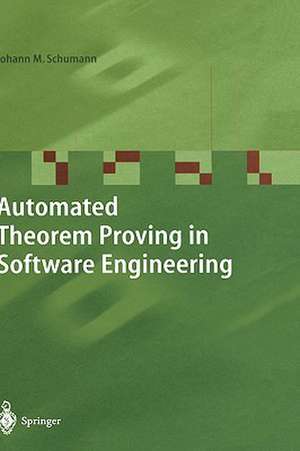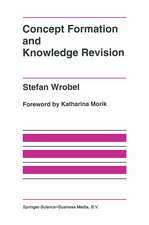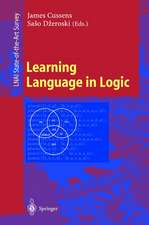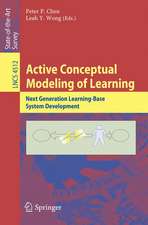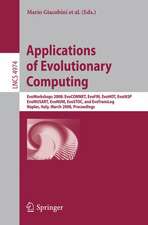Automated Theorem Proving in Software Engineering
Autor Johann M. Schumann Cuvânt înainte de D. Lovelanden Limba Engleză Hardback – 20 iun 2001
| Toate formatele și edițiile | Preț | Express |
|---|---|---|
| Paperback (1) | 329.76 lei 6-8 săpt. | |
| Springer Berlin, Heidelberg – dec 2010 | 329.76 lei 6-8 săpt. | |
| Hardback (1) | 334.38 lei 6-8 săpt. | |
| Springer Berlin, Heidelberg – 20 iun 2001 | 334.38 lei 6-8 săpt. |
Preț: 334.38 lei
Preț vechi: 417.97 lei
-20% Nou
Puncte Express: 502
Preț estimativ în valută:
63.99€ • 67.28$ • 52.87£
63.99€ • 67.28$ • 52.87£
Carte tipărită la comandă
Livrare economică 16-30 aprilie
Preluare comenzi: 021 569.72.76
Specificații
ISBN-13: 9783540679899
ISBN-10: 3540679898
Pagini: 250
Ilustrații: XIV, 228 p.
Dimensiuni: 155 x 235 x 20 mm
Greutate: 0.47 kg
Ediția:2001
Editura: Springer Berlin, Heidelberg
Colecția Springer
Locul publicării:Berlin, Heidelberg, Germany
ISBN-10: 3540679898
Pagini: 250
Ilustrații: XIV, 228 p.
Dimensiuni: 155 x 235 x 20 mm
Greutate: 0.47 kg
Ediția:2001
Editura: Springer Berlin, Heidelberg
Colecția Springer
Locul publicării:Berlin, Heidelberg, Germany
Public țintă
Professional/practitionerCuprins
1. Introduction.- 2. Formal Methods in Software Engineering.- 3. Processing of Logic.- 4. Characteristics of Proof Tasks.- 5. Requirements.- 6. Case Studies.- 7. Specific Techniques for ATP Applications.- 8. Conclusions.- References.
Recenzii
From the reviews:
"Automated Theorem Proving by Johann M. Schumann is an excellent survey on the application of the latter (classical) kind of ATP to the field of software engineering. … I most enjoyed its open, and necessary, criticism of common practice in the theorem proving community of ignoring the basic principles of software engineering … . It is a good systematic textbook that makes ATP more accessible to software engineers. It will be useful in teaching as well as in practice … ." (Florian Kammuller, Software Testing, Verification and Reliability, Vol. 12 (3), 2002)
"The structure and capabilities of Automated Theorem Provers (ATP) are presented in depth. … The book is very useful for software engineers who may learn how to apply the ATP for specific tasks in their field. … The book is also recommended to developers of ATP (be they mathematicians, logicians or computer scientists), who may find here suggestions for future work needed in order to improve the practical usability of their products in software industry." (Mihai Cipu, Zentralblatt MATH, Vol. 977, 2002)
"Automated Theorem Proving by Johann M. Schumann is an excellent survey on the application of the latter (classical) kind of ATP to the field of software engineering. … I most enjoyed its open, and necessary, criticism of common practice in the theorem proving community of ignoring the basic principles of software engineering … . It is a good systematic textbook that makes ATP more accessible to software engineers. It will be useful in teaching as well as in practice … ." (Florian Kammuller, Software Testing, Verification and Reliability, Vol. 12 (3), 2002)
"The structure and capabilities of Automated Theorem Provers (ATP) are presented in depth. … The book is very useful for software engineers who may learn how to apply the ATP for specific tasks in their field. … The book is also recommended to developers of ATP (be they mathematicians, logicians or computer scientists), who may find here suggestions for future work needed in order to improve the practical usability of their products in software industry." (Mihai Cipu, Zentralblatt MATH, Vol. 977, 2002)
Textul de pe ultima copertă
The growing demand for high quality, safety, and security of software systems can only be met by rigorous application of formal methods during software design. Tools for formal methods in general, however, do not provide a sufficient level of automatic processing. This book methodically investigates the potential of first-order logic automated theorem provers for applications in software engineering.
Illustrated by complete case studies on verification of communication and security protocols and logic-based component reuse, the book characterizes proof tasks to allow an assessment of the provers capabilities. Necessary techniques and extensions, e.g., for handling inductive and modal proof tasks, or for controlling the prover, are covered in detail.
The book demonstrates that state-of-the-art automated theorem provers are capable of automatically handling important tasks during the development of high-quality software and it provides many helpful techniques for increasing practical usability of the automated theorem prover for successful applications.
Illustrated by complete case studies on verification of communication and security protocols and logic-based component reuse, the book characterizes proof tasks to allow an assessment of the provers capabilities. Necessary techniques and extensions, e.g., for handling inductive and modal proof tasks, or for controlling the prover, are covered in detail.
The book demonstrates that state-of-the-art automated theorem provers are capable of automatically handling important tasks during the development of high-quality software and it provides many helpful techniques for increasing practical usability of the automated theorem prover for successful applications.
Caracteristici
Demonstrates the potential of automated theorem proving for applications in software engineering Performance and importance illustrated by detailed case studies Self-contained and with an extensive bibliography providing pointers to relevant work and related topics Includes supplementary material: sn.pub/extras
